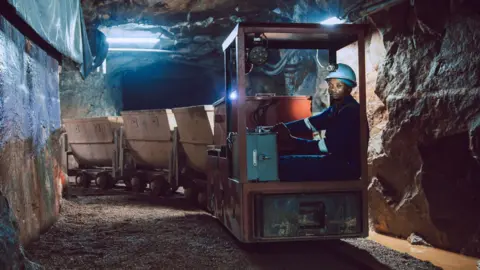你可能很少关注正在阅读本文的设备——只要它外观尚可且运行正常。但驱动和运行这些设备的元素,正成为世界两大经济体美国与中国之间不断升级的博弈焦点,而非洲国家正处于风暴中心。
非洲大陆蕴藏着丰富的关键矿物与金属资源,包括锂、稀土、钴、钨等,这些材料对个人电子设备的生产和运行至关重要,同时也是电动汽车、人工智能数据中心乃至武器系统等众多领域不可或缺的核心资源。
中国长期主导着全球关键矿物与金属市场,不仅拥有可观的国内储量,更通过对海外采矿业务(尤其在非洲)的大规模投资保障了供应链。在原材料加工领域,中国已建立起统治性地位,其出口限制的潜在风险令美国深感不安。
这种紧迫感促使美国加速拓宽关键矿产供应渠道,而非洲储量被视为实现这一战略的核心。最新年度数据显示,美国已悄然超越中国成为非洲最大外国直接投资国——根据约翰斯·霍普金斯大学中非研究计划获取的官方数据,2023年美国对非投资达78亿美元,远超中国的40亿美元。这也是自2012年以来美国首次重登对非投资榜首。
This American investment is being led by a government agency called the US International Development Finance Corporation (DFC). This was set up in 2019 during President Trump’s first term of office, and it is not shy about saying that its mission is to take on Beijing. The DFC says on its website that it was established as a means of”countering China’s presence in strategic regions”.What does this investment mean for African firms and countries who are beneficiaries?Last year Rwandan mining company Trinity Metalssecured a $3.9m grantfrom the DFC to help develop the three mines that it owns in the country, producing tin, tantalum and tungsten.”The US government has been very supportive of what we’ve been doing, to look at bringing that supply chain directly to the United States,” says company chairman Shawn McCormick.Trinity now sends tungsten from Rwanda to a processing plant in Pennsylvania. It has also struck a deal to send Rwandan tin to a smelter in Pennsylvania.Mr McCormick denies that the funding from Washington influenced the company’s decision to send supplies to the US.”This was not the US government who said to the CEO and I ‘could you please get that tungsten to America?’ It’s our decision as players in the commercial market.”Trinity is 5% owned by the Rwandan government, and Irish critical minerals investment firm TechMet is also a shareholder.Mr McCormick adds that while some mining operations in Africa can use untrained workers operating in dangerous conditions, Trinity follows the highest standards.”We have shown that there is a way to produce these materials in a conflict free, child labour free way that is professionalised, and that’s paying taxes and respecting the community and the environment, creating jobs and opportunity”.
Sepo Haimambo is an economist at banking group FNB Namibia. She says African nations must be assertive in standing up for their national interests when negotiating with US entities, and shouldn’t expect any favours.”To expect [the Americans] to show up and negotiate and propose clauses that are in Africa’s best interests on Africa’s behalf would be unrealistic,” she says. “So Africa really needs to prepare itself for these engagements and be really clear on what [outcomes] it wants.”Ms Haimambo adds that African governments should expand away from simple cash for minerals deals. “There’s an opportunity to look at different frameworks instead,” she says.”You could look at production sharing agreements, joint venture models, local equity participation. Ultimately that then creates an opportunity for African countries to create, maybe, sovereign wealth funds that can then invest into developmental areas like education, healthcare etc.”She also wants to see more processing of minerals and metals done in Africa, rather than simply exporting the ores overseas, as this would be more financially lucrative.
一家在非洲建设关键矿物和金属精炼厂的美国公司是ReElement Africa,它是美国集团American Resources的子公司。ReElement Africa正在南非豪登省建造该精炼厂。
ReElement Africa首席执行官本·金凯德表示:”我们意识到可以与非洲国家合作,在采矿项目资源旁边建设精炼设施,这非常有意义。这样实际上可以获取更多价值,提升劳动力技能,在该区域建立经济体系,并为进一步工业发展奠定基础。”
然而,匹兹堡卡内基梅隆大学的国际经济学家李·布兰斯泰特教授认为,美国错失良机。他指出,当撒哈拉以南非洲国家有人抱怨中国投资未能充分惠及当地民众时,特朗普对非洲国家征收的贸易关税降低了整个非洲大陆对美国的热情。
布兰斯泰特教授表示:”如果现任政府没有无缘无故地对大量非洲国家 indiscriminately 征收关税,美国本可能更好地从非洲对中国项目的不满中获益。”
海曼博女士补充说,未来美中在非洲可能还会面临来自其他国家日益激烈的竞争。她指出巴西、印度和日本等国家对非洲大陆的兴趣与日俱增。
【本文精选自BBC,原文链接:https://www.bbc.com/news/articles/cx2yl88wd3lo】

